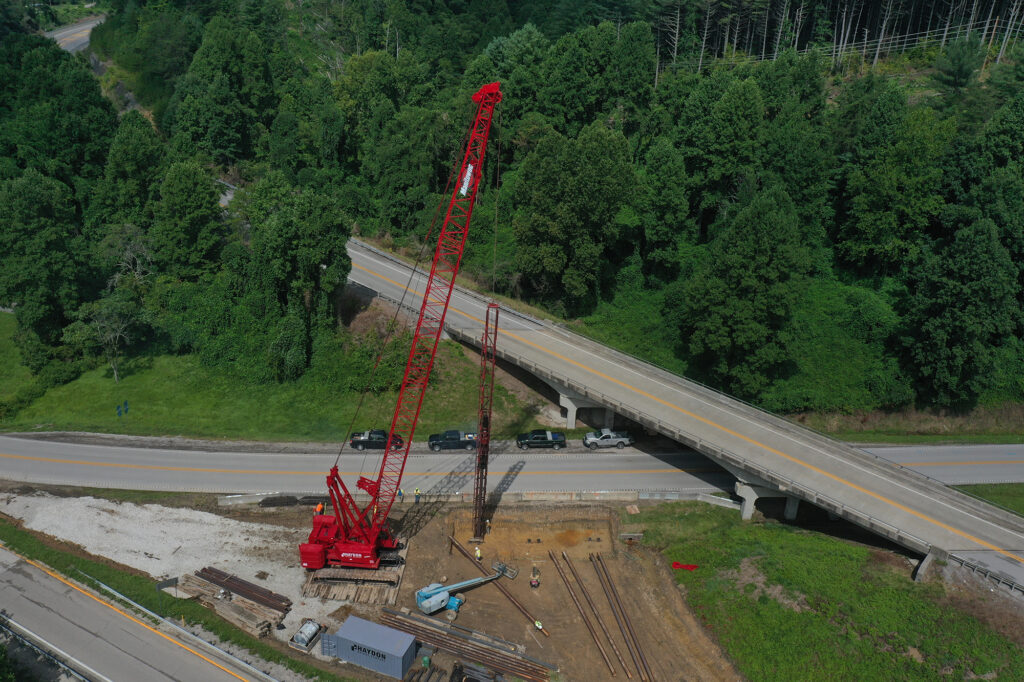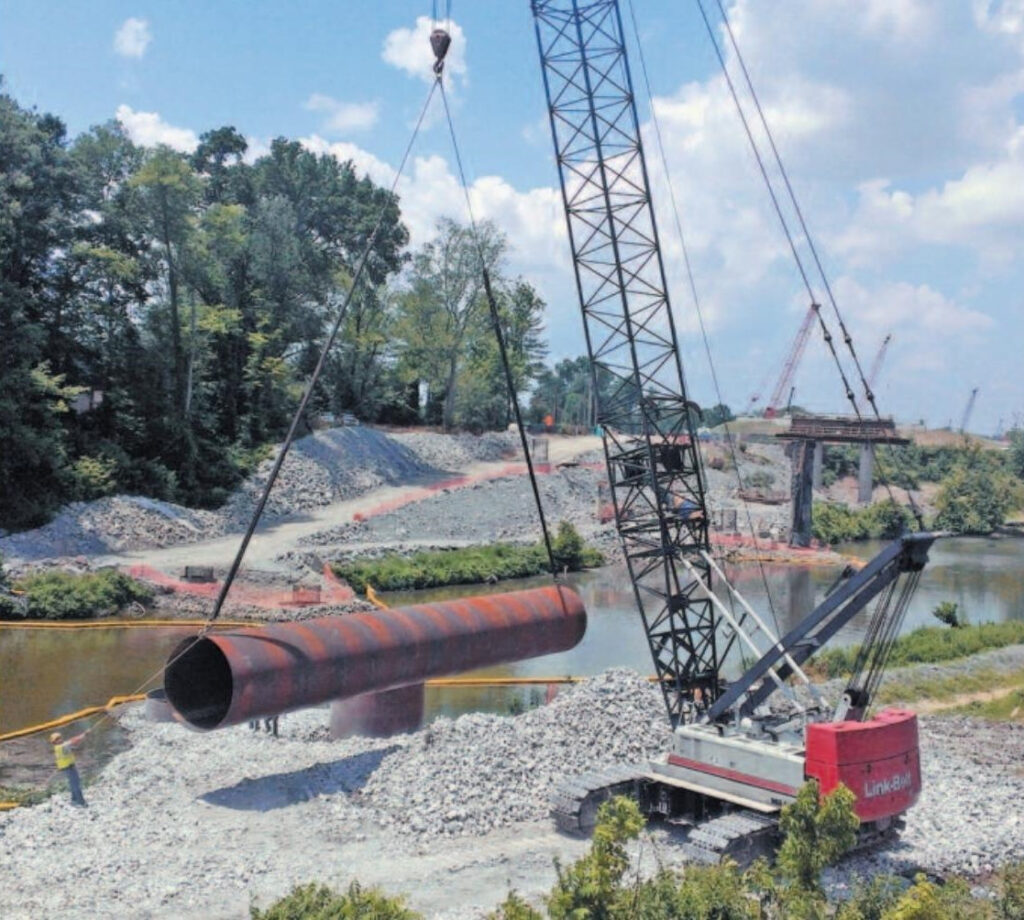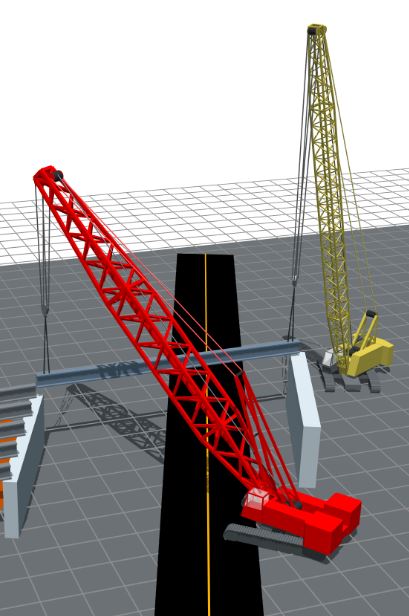Crane operators play an essential role on any construction site, but on road and bridge construction, where lifting heavy materials, equipment, and objects is necessary, they play a key role to the success, quality and safety of each project. They also play a vital role in ensuring the smooth and efficient progress of construction projects by safely lifting and moving heavy materials and equipment as needed.

What do Crane Operators Do?
On each bridge, road, tunnel, retaining or sound barrier wall, culverts and steel erection projects, we need cranes to do the heavy lifting, the transporting of materials to where they are needed, the erecting of foundations, and the tasks of lifting, lowering and installing pre-constructed concrete, steel and metal infrastructure into place.
What Skills are Needed for Crane Operators?

With loads, beams and walls weighing anywhere from several thousand pounds to nearly 200,000 pounds, safety is a high priority on the list of skillsets a Crane Operator needs. Essential skills include precision, focus, mathematical fluency, attention to detail, hyperfocus on safety protocols, and the ability to follow engineering plans and documents.
Operation of the machinery: A crane operator needs time and experience to become acquainted with the functionality and controls to feel comfortable with each type of machine that lift and move, including cranes, excavators, bulldozers, and skid steers. Before they begin working on a site, they will receive OJT (on the job training) with each piece of our equipment so the operators understand the controls, the sensitivity of the machinery, and functionality of the crane’s movement for precise positioning of loads.
“Many of our operators have commented they have enjoyed working with us, excelled at their training, and have improved operating skills because we only use high quality equipment. Our cranes and other equipment are safe to use, easier to manipulate and control because it’s well maintained and retired long before the wear and tear causes mechanical issues and ultimately safety mishaps.” – Bill Pettus, Safety Manager
Versatility of Load Type and Location: Crane operators are utilized at each stage of construction from bringing materials and supplies to the site, to preparing the construction site and erecting the safety structures, to lifting pre-constructed items into place and then tearing down and cleaning up the construction site when the project is complete.
Hyperfocus on Safety: Crane operators are responsible to understand, adhere and communicate the standard safety protocols to prevent property damage, accidents, injuries, or worse. From conducting pre-operational checks, ensuring proper rigging of the loads, to communicating effectively with ground personnel, safety comes first. No job should be rushed; no calculation trusted unless checked, rechecked and rechecked again; and no load moved until all procedural steps have been verified by several parties.
Communication Skills: Effective communication is necessary at each stage of the operation, from preplanning until the placement of the load. Crane operators are expected to understand and communicate with engineers, project foreman, and safety managers prior to stepping in the crane. They must communicate with ground personnel, signalers, and other workers on the construction site to coordinate lifting operations safely and efficiently.
Mathematical Fluency: Crane operators must assess the weight and dimensions of the load, as well as the distance, angle and height where the load will be placed. Even with the most precise calculations, a crane operator must consider extenuating variables such as weather, wind, ground saturation and geography of the land. Without taking all factors into consideration prior to the load move, such as wind speed, load stability, and site conditions, accidents can occur.
Record-Keeping: Crane operators must maintain accurate and comprehensive records of daily activities on each project, including the types, weights of loads lifted, operational hours, as well as any functionality, maintenance or safety issues encountered on the site or on the equipment. Crane Operators must also keep state-mandated inspection and maintenance records on each piece of equipment, and may be asked to conduct some maintenance tasks, including lubricating moving parts, inspecting cables, inspecting rigging equipment and troubleshooting any mechanical issues that arose during operation.
What training do Crane Operators Need in Kentucky?
Regardless of which state you reside or work in, crane operators are required to undergo specialized training and certification for safety and operational proficiency. Continued education on industry regulations and best practices will keep their certification valid and their skills up to date.
In addition to OSHA required courses, a crane operation certificate requires anywhere from 6 to 8 hours of classroom instruction as well as hands-on training supervised by a senior operator, followed by a written exam and equipment test. A Crane Operator training course is typically completed in 2-3 days or up to a week depending on the types of the cranes needed and the number of operators. Upon completion, participants will receive a wallet card of certification what will be good for five years.
Crane Operation Certification class topics include:
- Knowledge of a variety of cranes
- Safety standards for crane operation
- Rigging techniques
- Hand and radio signals
- Experience with load charts and capacity tables
The certification class is not the end of the training phase, but just the beginning as after you have your certification card, the real OTJ training begins. Depending on the employer or training program and the type of crane you wish to operate, it can take anywhere from a couple of months to a couple of years to become a full-fledged and trusted crane operator.

Training and Education are vital to the proficiency and safety record of each Crane Operator, which includes classroom instruction, on the job training and real-world experience. The following organizations provide training needed to become a Crane Operator:
- NCCCO Certification: The National Commission for the Certification of Crane Operators (NCCCO) is a nationally recognized organization that offers certification programs for crane operators. Many employers in Kentucky require crane operators to obtain NCCCO certification, which involves passing written and practical exams to demonstrate competency in crane operation.
- OSHA Compliance: Crane operators and their employers must comply with the Occupational Safety and Health Administration (OSHA) regulations regarding crane safety. OSHA’s regulations require crane operators to be trained and certified to operate cranes safely on construction sites and other work environments.
- Accredited Training Programs: Crane operators in Kentucky can undergo training through various accredited programs offered by vocational schools, community colleges, trade unions, and private training providers. Call Haydon Bridge Company if you would like recommendations for local training programs.
- OTJ Experience: In addition to classroom instruction, crane operator training programs often include hands-on training with actual crane equipment. This practical experience is essential for crane operators in real-world scenarios.
- Continuing Education for License and Certification Renewal: Crane operators in Kentucky are required to renew their licenses or certifications periodically to ensure they remain up-to-date with the latest safety standards and industry best practices.
What are the Benefits of Becoming a Crane Operator?

What little child did not dream of working outside moving dirt? Regardless, many workers enjoy working with their hands, working outside in nature, and seeing tangible evidence of their hard work. In fact, science shows that those who work outside have various benefits on our physical and mental health including “benefits include increased creativity, productivity and positivity.” Other noticeable benefits include improved memory, lower blood pressure, increased energy levels, improved mood and feelings of teamwork and collaboration.
“A University of Michigan study suggests that spending only one hour in nature can reduce cortisol levels (the stress hormone) by 20%.”
– University of Michigan
Other career benefits include:
- Highly Competitive Salary: Operators receive competitive pay that is based on the scale set by the union, and increases as they gain experience or obtain specialized certifications. At Haydon Bridge Company, we comply with the union scale of pay, with a competitive advantage and additional benefits for our crane operators.
- Job Stability: With a steady demand for skilled and certified crane operators, and the ongoing infrastructure and construction projects that require crane operators at each stage of construction, finding and retaining work is not an issue in most regions.
- Career Advancement: With dedication and experience, crane operators can progress to higher-paying positions within the construction industry.
- Specialized training: Crane Operators at Haydon Bridge Company receive specialized training considering the scope and variety of projects we partake in, including but not limited to construction of highways, roads and bridges, bridge foundations, box culverts, retaining and sound walls, cofferdams, and railroad bridges. These specialized skills can increase your value as an employee as well provide career opportunities and advancements, regardless of where you go or where you live.
- Union Membership & Benefits: As Crane Operators in Kentucky are part of the Steel Workers Union in Eastern KY, they receive additional benefits including healthcare coverage, retirement plans, job training programs and advocacy for competitive wages and safe working conditions.
- Feeling Pride in your Work: As Haydon Bridge Company plays a crucial role in Kentucky and the Eastern United States’ transportation infrastructure, our crane operators can feel real pride in helping to construct, build, and maintain roads, bridges and railroad bridges that contribute to the stability and financial health of our communities. As a crane operator, you will have a tangible impact on the shape of our community, here in Kentucky and abroad.
Interested in learning more about a career as a Crane Operator at Haydon Bridge Company? Please visit our Careers page to see current opening and instructions on how to apply to be part of an exciting and experienced team.







